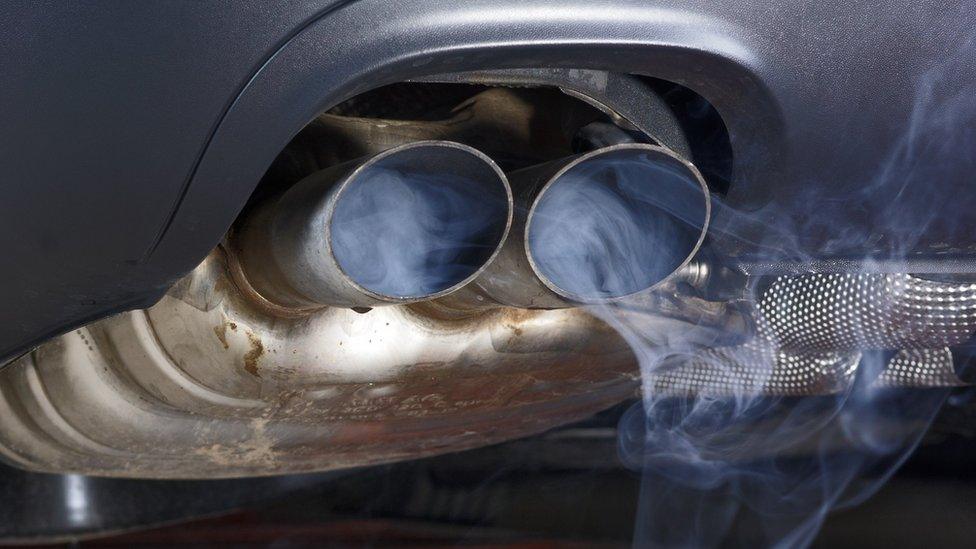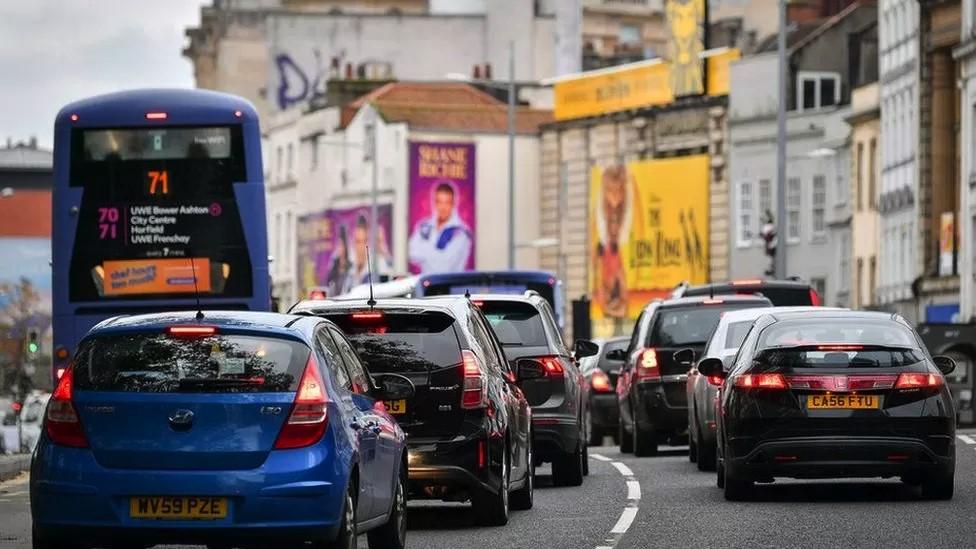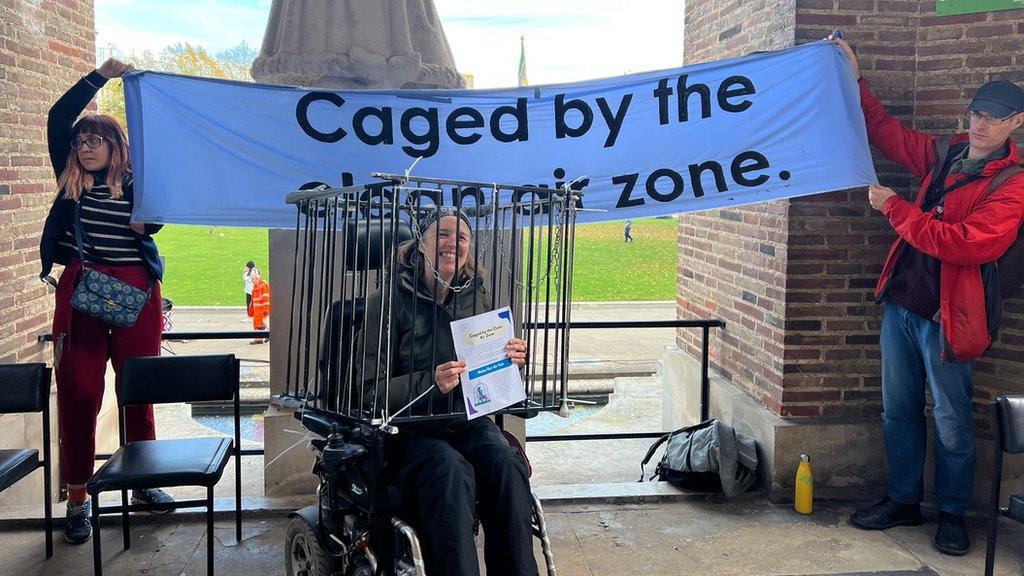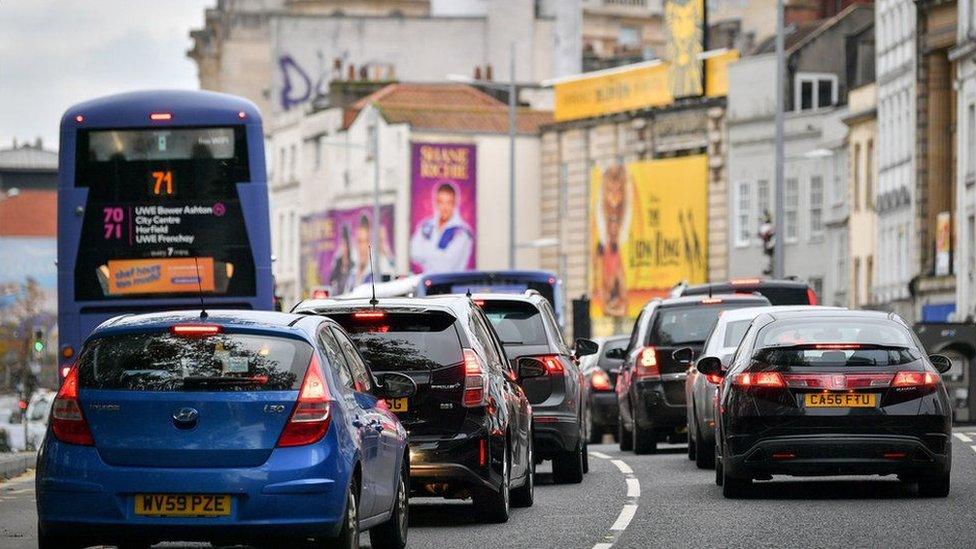Bristol Clean Air Zone explained: Who has to pay and how much?
- Published
The BBC's Paul Barltrop goes through how the zone will impact motorists in the city.
Bristol is poised to join a growing number of cities in charging some of the most polluting vehicles to enter the city centre.
It comes on the back of growing concern about the impact of air pollution on public health.
The Bristol Clean Air Zone (CAZ) is due to start on 28 November, and will cover the city centre and some of the inner suburbs.
But drivers will be wondering who has to pay and how much.
Here is what you need to know.
Where is the CAZ?
The zone stretches just north of the James Barton Roundabout, to Hotwells to the west, Temple Way and Temple Meads Station in the east and south to Coronation Road in Southville.
It also juts up Hotwells Road, under the Clifton Suspension Bridge and up Bridge Valley Road to where it meets Ladies Mile and Clifton Down, while in Newtown, to the east of the city, it covers a section of West Street to where it meets Midland Road.
There is a map, external of the CAZ on Bristol City Council's website.
What is the point of the CAZ?
Cities across the country have rolled out CAZs in a bid to bring down inner-city pollution, particularly nitrogen dioxide levels, to below legal limits set by the government.
There is a growing awareness of how damaging dirty air can be on our health, with children, older people and people with heart, breathing and other health problems most at risk.
It is hoped CAZs will persuade more people to ditch the most polluting vehicles, and to opt to walk, cycle or take public transport instead.
The council has said they are not intended to be money-making schemes, so any funds raised over the first 10 years will be spent on CAZs operational costs and any additional revenue will go towards the council's transport policies, including improving bus services and cycle routes.

Bristol City Council has funding to help drivers change or modify their vehicles
Who has to pay and how much?
The owners of certain polluting vehicles will have to pay and Bristol City Council estimates 71% of vehicles travelling to the city are already compliant.
Any diesel vehicles that do not meet Euro 6 emissions will be charged, and these are likely to have been registered before September 2015.
Petrol vehicles that do not conform to Euro 4 standards will also be charged, and they are generally ones that were registered before 1 January 2006.
Drivers can check their car, van or lorry's compliance on the CAZ section of the government's website, external.
Private cars, taxis and vans or lorries weighing less than 3.5 tonnes will pay £9 per day, while non-compliant lorries, buses and coaches will pay £100.
When does the charge apply?
The charge will apply 24 hours a day, seven days a week, but only once in a 24-hour period, meaning non-compliant vehicles can make multiple journeys in a day.
Certain drivers can apply for a temporary exemption, for example visitors to clinics and hospitals within the zone can apply for a seven day pass.
Blue badge holders can also apply for an exemption to give them time to change or upgrade their vehicle.
Community transport vehicles may also be able to avoid the charge, while people driving a vehicle that is disabled class tax are automatically exempt from paying in all CAZs nationally.
Drivers can find out if they can apply for an exemption on the council's website, external.

Non-compliant cars will be charged £9 a day
I can't afford to change vehicles, what do I do?
Bristol Council has a multi-million pound funding pot to help drivers change or modify their vehicles.
Of this, £1.8m is earmarked for cars and drivers able to apply for a loan or a grant of up to £2,000 - disabled drivers and those on incomes of less than £27,000 will be given priority.
The lions share, £32m, is reserved for businesses to upgrade HGVs, LGVs, coaches taxis and private hire vehicles, with sums of between £1,500 and £16,000 available depending on the vehicle.
A further £5.9m will be spent on helping people switch to public transport, walking or cycling, with funding available for cycle training, free bus tickets and loans for electric bikes.
Those planning to apply for financial support can register their interest on the council's website., external
How do I pay?
Drivers can pay online using the CAZ payment portal on the government's website, external, or by calling by the Clean Air Zone support line on 0300 0298888.
The charge can be paid up to six days before or six days after entering the zone.
Businesses handling a fleet of vehicles can set up an account to manage multiple payments on the government's website.
What happens if I don't pay?
Drivers who fail to pay will be issued with a fine of £120 via penalty charge notice (PCN).
The fine will be cut by 50% to £60 if it is paid within 14 days.
Fines can be paid online or over the phone, where the driver will be asked to quote their 10 digit PCN number.
Those with exemptions for Bristol's Clean Air Zone will not need to log anything or show anything in their vehicle.

Follow BBC West on Facebook, external, Twitter, external and Instagram, external. Send your story ideas to: bristol@bbc.co.uk , external
Related topics
- Published19 October 2022

- Published1 September 2022

- Published6 July 2022
